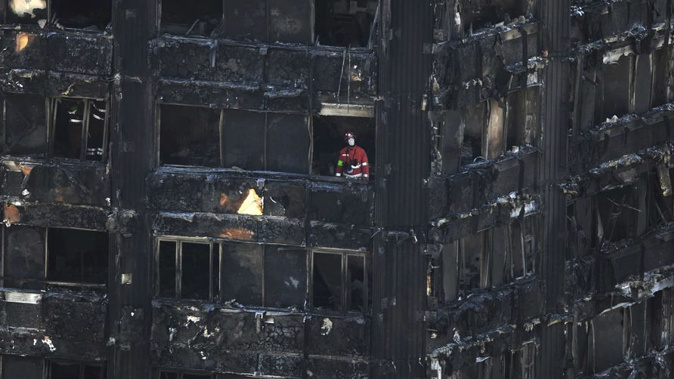
The Grenfell Tower fire started in a faulty fridge and insulation and tiles on the block have failed safety tests, Metropolitan Police Detective Superintendent Fiona McCormack has said.
McCormack says officers have seized documents in the investigation into the fire.
"What we are being told at the moment by the Building Research Establishment is that the cladding and insulation failed all safety tests," she told reporters today.
LIVE: Detective Ch Superintendent Fiona McCormack provides statement on the investigation into #GrenfellTower fire https://t.co/du4ff7CQHZ
— Metropolitan Police (@metpoliceuk) June 23, 2017
Thousands could be evacuated from their homes, as the government initially confirmed that least seven blocks have already been identified as "combustible".
But writing in a letter to MPs, Communities and Local Government Secretary Sajid Javid confirmed the number has now risen to 11 high-rise blocks across eight local authority areas in England.
British Prime Minister Theresa May said earlier today that nobody will be forced to live in dangerous blocks and revealed 100 high-rises a day will be tested for potentially lethal cladding.
The figures only cover council-owned buildings and not privately-owned properties across the UK.
Grenfell Tower's aluminium panels had a flammable plastic core which experts have blamed for accelerating the fire that killed 79 people last week.
In a day of widespread concern over Britain's high rise housing:-
• It emerged that 11 tower blocks examined by experts have been found to be combustible, with hundreds of others still being tested.
• Camden Council believed its buildings were safe, but discovered after testing that cladding on five blocks was potentially dangerous. It is removing the material and could now sue contractors Rydon.
• Three high-rise blocks in Plymouth have the same polyethylene cladding that was in Grenfell Tower and are being monitored around the clock.
• A housing association building in Tottenham, north London is being tested after residents were told it has the same cladding as Grenfell Tower.
• Barnet Council has found three of its blocks have similar metal panels as Grenfell Tower, but say they are not combustible.
• Salford Council says nine of its tower blocks have cladding that is similar to the material used on Grenfell Tower, with tests due to be carried out to check whether it is combustible.
• The other buildings identified as a risk have not been announced until residents have first been warned. The government are testing other buildings at a rate of 100 a day.
Camden Council has already begun removing cladding from five towers of up to 23-storeys on its giant Chalcot Estate over fears they are potentially dangerous.
But residents in the 721 flats will not be moved and fire wardens will be put there 24 hours a day to reassure locals and help in the event of a blaze.
The north London council looks set to sue contractor Rydon, who also carried out the Grenfell work, claiming "the panels that were fitted were not to the standard that we had commissioned".
Three high-rise tower blocks in Plymouth, Devon, have also been found to be clad in the same combustible material to the Grenfell Tower in London.
Occupants of the 16-storey Lynher, Tamar and Tavy buildings in Devonport, Plymouth were told of the potential fire risk to their buildings. The towers will now be monitored round the clock by security teams.
Other councils across the UK have been ordered to provide samples of the cladding used on high-rises by Monday and these will be tested at a rate of 100 per day.
Take your Radio, Podcasts and Music with you









